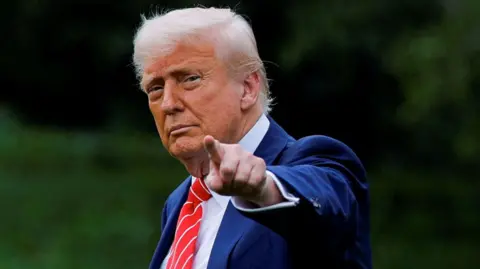In a recent report released by the Organization for Economic Co-operation and Development (OECD), global economic growth is projected to decelerate due to the impact of tariffs imposed by former U.S. President Donald Trump. This marked shift indicates a downbeat outlook for worldwide growth, forecasting a decline to 2.9% from the previously expected figure of 3.1%. The OECD attributes this revision primarily to an increase in trade barriers, emphasizing the pervasive nature of economic stagnation that will affect virtually all countries worldwide.
The OECD’s chief economist, Alvaro Pereira, expressed concerns regarding this downturn, stating that “we are forecasting basically a downgrade for almost everybody,” indicating a widespread expectation of reduced growth and job opportunities as compared to prior forecasts. This view highlights the interconnectedness of global economies and how trade policies can have far-reaching impacts on international economic health.
A significant part of the concern arises from Trump’s erratic approach since his return to the White House, which has led to instability in international trade relations. Countries targeted by U.S. tariffs are feeling the economic repercussions, fostering a climate of uncertainty that affects both domestic and foreign investments. The unpredictability associated with these measures exacerbates the challenges facing businesses trying to navigate the global market.
Additionally, the OECD revised its outlook for the U.S. economy. It now predicts a slowdown to 1.6% growth, sharply down from 2.2% in previous estimates. Looking further ahead, economists warn that this trend of decreasing growth is expected to continue into 2026, raising alarms about the implications for job creation and overall economic vitality in the United States.
A key component of this economic decline is the looming issue of inflation, which the OECD cautions is becoming increasingly problematic for the U.S. economy. This situation stands in contrast to Trump’s promises during his presidential campaign to reduce inflation, indicating a divergence from expected outcomes. As inflationary pressures mount, any hopes for robust economic recovery may be dashed unless significant policy adjustments are made.
The report also serves as a wake-up call to international leaders about the ripple effects of protectionist policies, particularly tariffs. With the OECD underscoring the significance of trade cooperation in fostering economic well-being, a collective response to mitigate these tariffs may be necessary to restore confidence and stabilize global markets.
In light of these developments, it is evident that Trump’s trade policies have had a tremendous influence on global economic forecasts, diminishing growth expectations not only in the United States but across international borders. The OECD’s warnings suggest that unless trade barriers are addressed, the potential for a full recovery remains jeopardized.
In conclusion, the OECD’s insights illustrate the vulnerabilities inherent in a heavily tariff-driven economy, making it imperative for policymakers to reassess strategies to foster a more cooperative and stable international trade environment. Without addressing these issues, the likelihood of corrective action diminishes, leading to protracted economic challenges for many countries. As global interconnectedness continues to grow, the need for diplomatic approaches to trade becomes increasingly essential for ensuring long-term economic stability.



